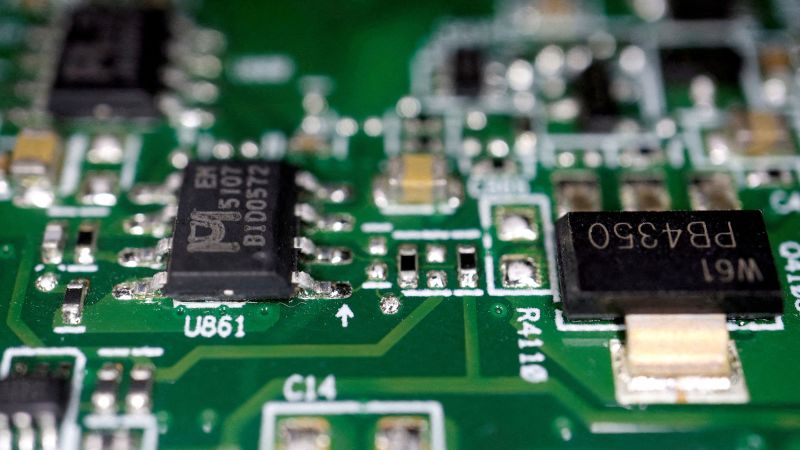CNN
—
President Donald Trump said on Tuesday that he plans to impose tariffs of around 25% on auto imports as well as semiconductors and pharmaceuticals shipped to the United States as early as April 2.
Trump recently enacted a 10% across-board-tariff on goods coming from China and 25% tariffs on all steel and aluminum imports.
For tariffs on semiconductor chips and drugs, he told reporters at his resort in Mar-a-Lago, Florida that he intended to eventually increase the rate even more.
“It’ll go substantially higher over a course of a year,” he said. But he added that he wanted to give time for potentially affected companies to bring their factories to America to avoid tariffs.
“We want to give them a little bit of a chance,” he said.
The revelation comes days after Trump ordered an investigation into other nations’ tax and tariff policies, paving the way for new reciprocal tariffs to take effect as soon as April 2, the day after the investigation is set to conclude, Howard Lutnick, Trump’s pick for Commerce Secretary said last week.
Trump’s latest announcement underscores his push for a more “balanced” trade with foreign markets and to reshore strategic industries. He has long criticized what he deems as unfair foreign treatment of US exports.
The steep new tariffs could have far-reaching effects, extending beyond the specific industries where taxes are levied, and hurt consumers with higher prices and businesses with increased costs, economists and industry experts have warned.
Consumers are expected to feel most of the burn by the new import taxes on automobiles, as prices of cars could jump by thousands of dollars, experts have warned. Nearly half of vehicle sales in the US last year, including cars and light trucks, were imported from foreign countries.
The president did not offer further details on whether the 25% tariff would be applied across the board to all countries or whether cars manufactured in Mexico and Canada under a free trade agreement Trump signed during his first term would be spared.
While US companies, like AI chipmaker Nvidia, dominate the semiconductor industry, manufacturing of chips has long been outsourced to Asia due to cost and technical reasons over the past decades. Nvidia declined to comment.
Taiwan Semiconductor Manufacturing Company (TSMC) pioneered the model of contract chipmaking, manufacturing chips for others without bearing its name, and it has emerged as the world’s largest contract chip producer.
TSMC told CNN that its chipmaking plants in Arizona, which were announced in 2020 during Trump’s first term, are on track as planned but declined to comment further.
Trump has repeatedly accused Taiwan of stealing America’s chip industry, a claim that experts dispute.
Though details remain unclear, new semiconductor tariffs could hurt Asian chip giants the most, including the likes of TSMC, South Korea’s Samsung and SK Hynix, whose manufacturing plants remain largely in Asia. The threat of new import taxes could also hasten the steps taken by these companies to set up shop or expand in the US.
As for the pharmaceutical industry, the US purchased more than $176 billion of drugs and related goods in 2023, according to US trade data, making it the largest importer of pharmaceutical products that year.
European, Indian and Chinese firms could be the hardest hit. In 2023, Ireland accounted for 20.4% of pharmaceutical imports, followed by 10.8% from Germany, 8.6% from Switzerland, 6.2% from India and 3.4% from China.
